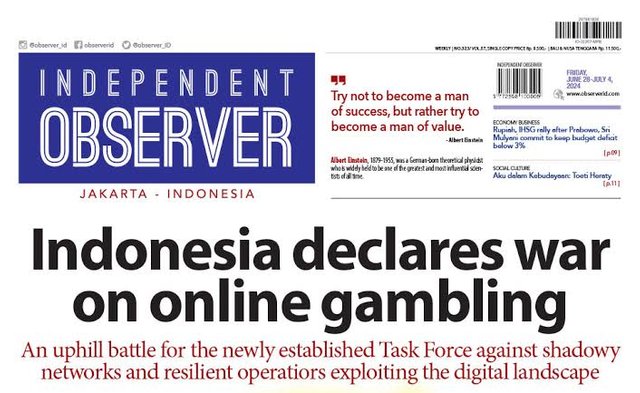Online Gambling Out of Control in Indonesia: A Digital Threat the World Must Be Aware Of

The phenomenon of online gambling in Indonesia has reached a crisis point. With over 88 million players, the majority of whom are young people, this issue is not just a local problem, but a digital threat that must be taken seriously by the world. In recent years, online gambling has expanded rapidly, targeting young people who are vulnerable to its impact. What is happening in Indonesia can serve as an important lesson for other countries in facing the rapid advancement of technology.
The Rise in Online Gambling Players
According to various reports, the number of online gambling players in Indonesia continues to increase, with illegal gambling sites becoming more easily accessible, despite the government's ongoing efforts to block them. One report shows that over 88 million people in Indonesia are involved in online gambling. The majority of them are young people, often feeling trapped in monotonous routines and seeking an escape through gambling. The impacts are significant, ranging from devastating financial losses to psychological disturbances that can harm their social lives.
The Influence of Technology and Digitalization
The rise in online gambling in Indonesia cannot be separated from the advancement of technology and digitalization. Technology has made it easier for illegal gambling sites to spread, often deceiving players with enticing offers. Coupled with the ease of transactions through digital applications and e-wallets, players can easily access gambling without worrying about legal actions they might face.
On the other hand, as artificial intelligence (AI) and algorithms continue to evolve, online gambling sites are becoming more adept at crafting strategies to attract players. This makes gambling even more enticing for those who have never tried it or are finding it difficult to stop. The digital world makes it increasingly difficult to enforce laws against illegal gambling.
The Efforts of the Indonesian Government
The Indonesian government, through various agencies such as the Ministry of Communication and Information (Kominfo) and the Commodity Futures Trading Regulatory Agency (BAPPEBTI), has worked hard to eradicate online gambling. These efforts include blocking gambling sites, cracking down on gambling apps on digital platforms, and closely monitoring online transactions. However, despite these efforts, online gambling continues to grow rapidly because players can use various methods to access these sites, such as VPNs and masking apps.
Moreover, the social and economic issues faced by many people, especially the youth, further exacerbate this situation. Many young people get caught up in gambling due to a lack of understanding about its long-term consequences and the economic pressures they face. The government has paid more attention to addressing this issue, but the role of society and the private sector is also crucial in combating online gambling together.
A Lesson for the World
The case of online gambling in Indonesia offers valuable lessons for other countries, especially those experiencing rapid technological progress. This gambling issue can quickly spread to other countries through the internet. Therefore, it is essential for every country to strengthen digital surveillance and enforce strict laws against online gambling. Additionally, public awareness of the dangers of online gambling must be increased through education and social campaigns.
Furthermore, international collaboration in combating online gambling is also crucial. Given the global nature of the internet, efforts to block gambling sites from one country alone are insufficient. Countries must work together to tackle this issue globally, through policies that support each other and information sharing.
Solutions and Moving Forward
To address the increasingly severe online gambling crisis in Indonesia, a more holistic approach is needed. In addition to stricter law enforcement, education about the negative impacts of gambling and the use of technology to combat online gambling should be further strengthened. Prevention programs, such as providing healthy entertainment alternatives and educating young people about the dangers of gambling addiction, also need to be promoted. The government, educational institutions, and society must work together to create a safer environment for the younger generation.
Technology should also be maximized to detect and prevent online gambling sites. By utilizing artificial intelligence and advanced algorithms, we can create more effective systems to combat illegal gambling.
Conclusion
Online gambling in Indonesia is a very serious issue and must be addressed immediately. Not only Indonesia but the whole world should learn from this phenomenon to prevent similar problems from arising in their respective countries. If left unchecked, online gambling could become a bigger threat in the future. As a global society, we need to actively participate in maintaining a safer and healthier digital world, especially for the younger generation, who are most vulnerable to gambling addiction.